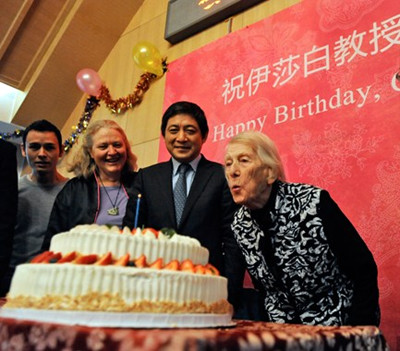You're listening to NEWS Plus Special English. I'm Liu Yan in Beijing.
Most city residents with mobile phones and Internet access need not bother leaving the house to take a delivery. Deliveries including food, clothing or even fresh vegetables or meat they booked online for dinner can come right to their door.
But such convenience is generally not available to most college students, even though they are heavy online shoppers.
Parcels ordered by students typically must be picked up at the school gate or at designated collection points on campus. It often happens that when a delivery arrives, the recipient is in class and unable to receive it immediately.
Without a system to receive parcels, the result can be lost goods.
It's a big headache for college students, who as a group are keen on online shopping. It's something they hope can be solved.
That's where Jilin University of Finance and Economics graduate, 23-year-old Wang Zuowen comes in.
Students at the university need only download an app, ZhaiWoWo, or sign in using WeChat, the mobile messaging app.
From there, they can track parcels and information about the delivery service, and staff members collect the parcels and send them to students' doors accurately, safely and promptly. And, surprisingly, the service is free.

This is NEWS Plus Special English.
As one of the first foreign teachers at a Chinese university and a witness to China's transformation from war to peace, Canadian Isabel Crook celebrated her 100th birthday on Thursday.
Crook commemorated the landmark at Beijing Foreign Studies University, together with her family, her students and friends, as well as officials from the State Administration of Foreign Experts Affairs.
For many students, Crook is a role model who devoted most of her life to English education in China.
Crook was born to a Canadian missionary family in 1915 in Chengdu, the capital of southwest China's Sichuan province. She spent half her youth in China.
In 1939, after six years' study at the University of Toronto, she returned to China with a double degree in Art and Psychology, and then started her research on anthropology in Sichuan province.
The book Prosperity's Predicament: Identity, Reform, and Resistance in Rural Wartime China was based on her work from 1940 to 1941 in a small rural village in Sichuan.
She later met David, her late husband and an active communist. Influenced by him, she joined the Communist Party of Great Britain in 1942.
Since the establishment of the People's Republic of China in 1949, the couple has been teaching at the Beijing Foreign Studies University. Formally known as Beijing Foreign Languages Institute, this is the leading foreign language university in China. Isabel Crook retired in 1980.
In early September, Crook was awarded a medal from the State Administration of Foreign Experts Affairs, for her contribution to the victory in the Chinese People's War of Resistance against Japanese Aggression.












